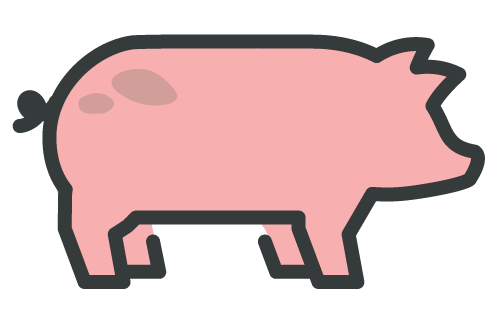Where Do Novel Flu Viruses Come From?

Flu viruses constantly change (mutate). In rare situations, these changes can make it easier for certain viruses to spread from animals to people and possibly between people.
Many animals have their own flu viruses that can cause them to have fever, tiredness, and respiratory symptoms such as cough, runny nose, and trouble breathing. Some animals infected with flu viruses can look healthy, but they are still able to spread the virus to other animals.

Most animal flu viruses rarely infect humans. However, flu viruses from birds and pigs (swine) can mix and sometimes make humans sick. Bird or swine flu can spread very fast between animals and cause large numbers of animals to get sick and die.
How Do Novel Flu Viruses Spread?
 People can be exposed to novel flu viruses when they have close contact with infected animals or their environments. Flu viruses usually spread through droplets that come from an infected person’s or animal’s nose and mouth. Droplets spread through the air when a person or animal coughs or sneezes. People can also spread droplets in the air when they talk. Healthy animals or people can get infected when they breathe in these virus particles from droplets in the air or if they touch a surface where the droplets have landed and then touch their eyes, nose or mouth. Birds shed flu virus in their feces (poop), and humans can become infected with bird flu through contact with poop particles on surfaces or in the air.
People can be exposed to novel flu viruses when they have close contact with infected animals or their environments. Flu viruses usually spread through droplets that come from an infected person’s or animal’s nose and mouth. Droplets spread through the air when a person or animal coughs or sneezes. People can also spread droplets in the air when they talk. Healthy animals or people can get infected when they breathe in these virus particles from droplets in the air or if they touch a surface where the droplets have landed and then touch their eyes, nose or mouth. Birds shed flu virus in their feces (poop), and humans can become infected with bird flu through contact with poop particles on surfaces or in the air.
What Do I Need to Know to Prevent Novel Flu?
Most people do not have any immunity against novel flu, so prevention is important to keep novel flu from spreading.
If you visit animals at fairs, petting zoos, educational farms, summer camps, or other places where animals are present, you can help prevent getting and spreading novel flu by taking the following steps:
- Wash your hands often with soap and water.
- Regular handwashing can remove harmful germs and prevent illness.
- Handwashing is very important after touching or being around animals and before eating or putting anything in your mouth.
- Stay away from sick or dead wild animals, especially wild pigs (boar) and wild birds like ducks and geese.
- Pigs and birds that seem healthy can still spread germs. Young children and older adults are more likely to get sick from animal germs, even if they are healthy. People in these groups should stay away from pigs and birds (such as chickens and ducks) and should not visit swine or bird barns and exhibits.
- Keep food and drink for humans out of barns, coops, and other areas where animals are kept — don't eat, drink, or put anything in your mouth while you are in animal areas and not until you wash your hands after leaving animal areas.
- Don't take toys, cups, or other household items into animal areas where they can get contaminated with animal germs.
What Do I Do to Prevent Novel Flu If I Own or Show Poultry or Pigs?
People who raise and show birds or pigs can follow these additional guidelines to help prevent flu in their animals:
- When you add a new animal to your herd or flock, keep it separated until a veterinarian can examine it and check that it is not carrying any diseases.
- If you or someone close to you is sick with flu-like symptoms (such as cough, fever, or runny nose), plan for someone else to feed and care for your animals until you or your close contacts are well.
- Keep animal areas clean by regularly removing poop and washing surfaces with soap and water. When cleaning pig poop and bird droppings, wear protective clothing, gloves, and a mask that covers your mouth and nose.
- Make sure that animals receive regular veterinary care, including preventive care such as vaccinations.
- Follow your veterinarian's advice for vaccinating your animals against flu and other diseases.
- Remove and separate from the herd or flock any animals that have a cough, diarrhea, or other signs of flu until they are no longer sick.
More Information: Prevention and Antiviral Treatment of Avian Influenza A Viruses in People
What is the California Department of Public Health Doing About Novel Flu?
Many agencies in California are working together to track and prevent novel flu in California, especially avian flu (bird flu), which can pose a threat to human health. The California Department of Public Health (CDPH) works with local health departments to track human exposures to avian flu, while the California Department of Fish and Wildlife (CDFW) and the California Department of Food and Agriculture (CDFA) respond to outbreaks of avian flu in wild birds, poultry farms and livestock ranches, and backyard flocks throughout the state. Tracking avian flu is important to prevent the spread of flu between farms and to humans. CDPH, CDFA, CDFW, and local health departments work together to identify and respond to outbreaks of avian flu, stop or slow its spread, and monitor and evaluate people who had contact with infected animals.